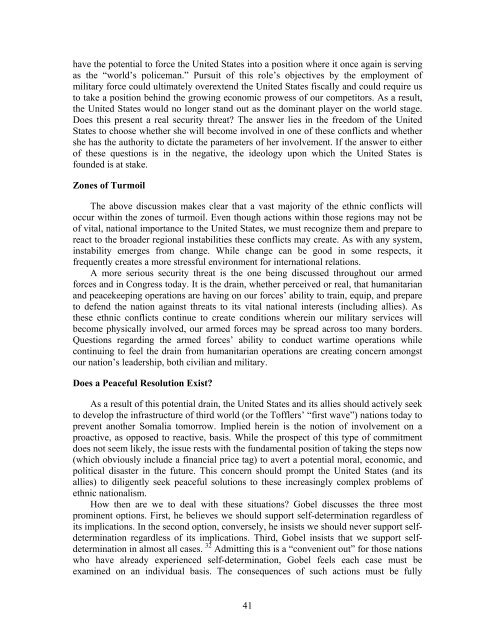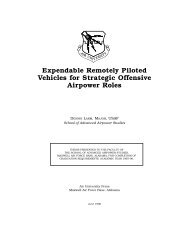Global Security Concerns - Project Gutenberg Consortia Center
Global Security Concerns - Project Gutenberg Consortia Center
Global Security Concerns - Project Gutenberg Consortia Center
You also want an ePaper? Increase the reach of your titles
YUMPU automatically turns print PDFs into web optimized ePapers that Google loves.
have the potential to force the United States into a position where it once again is serving<br />
as the “world’s policeman.” Pursuit of this role’s objectives by the employment of<br />
military force could ultimately overextend the United States fiscally and could require us<br />
to take a position behind the growing economic prowess of our competitors. As a result,<br />
the United States would no longer stand out as the dominant player on the world stage.<br />
Does this present a real security threat? The answer lies in the freedom of the United<br />
States to choose whether she will become involved in one of these conflicts and whether<br />
she has the authority to dictate the parameters of her involvement. If the answer to either<br />
of these questions is in the negative, the ideology upon which the United States is<br />
founded is at stake.<br />
Zones of Turmoil<br />
The above discussion makes clear that a vast majority of the ethnic conflicts will<br />
occur within the zones of turmoil. Even though actions within those regions may not be<br />
of vital, national importance to the United States, we must recognize them and prepare to<br />
react to the broader regional instabilities these conflicts may create. As with any system,<br />
instability emerges from change. While change can be good in some respects, it<br />
frequently creates a more stressful environment for international relations.<br />
A more serious security threat is the one being discussed throughout our armed<br />
forces and in Congress today. It is the drain, whether perceived or real, that humanitarian<br />
and peacekeeping operations are having on our forces’ ability to train, equip, and prepare<br />
to defend the nation against threats to its vital national interests (including allies). As<br />
these ethnic conflicts continue to create conditions wherein our military services will<br />
become physically involved, our armed forces may be spread across too many borders.<br />
Questions regarding the armed forces’ ability to conduct wartime operations while<br />
continuing to feel the drain from humanitarian operations are creating concern amongst<br />
our nation’s leadership, both civilian and military.<br />
Does a Peaceful Resolution Exist?<br />
As a result of this potential drain, the United States and its allies should actively seek<br />
to develop the infrastructure of third world (or the Tofflers’ “first wave”) nations today to<br />
prevent another Somalia tomorrow. Implied herein is the notion of involvement on a<br />
proactive, as opposed to reactive, basis. While the prospect of this type of commitment<br />
does not seem likely, the issue rests with the fundamental position of taking the steps now<br />
(which obviously include a financial price tag) to avert a potential moral, economic, and<br />
political disaster in the future. This concern should prompt the United States (and its<br />
allies) to diligently seek peaceful solutions to these increasingly complex problems of<br />
ethnic nationalism.<br />
How then are we to deal with these situations? Gobel discusses the three most<br />
prominent options. First, he believes we should support self-determination regardless of<br />
its implications. In the second option, conversely, he insists we should never support selfdetermination<br />
regardless of its implications. Third, Gobel insists that we support selfdetermination<br />
in almost all cases. 32 Admitting this is a “convenient out” for those nations<br />
who have already experienced self-determination, Gobel feels each case must be<br />
examined on an individual basis. The consequences of such actions must be fully<br />
41






